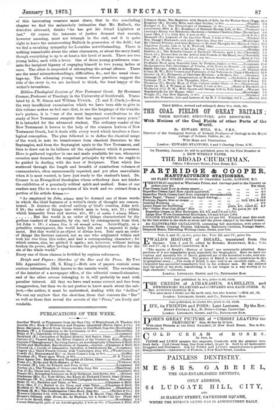Biblico-Theological Lexicon of New Testament Greek. By Hermann 4:3remer, Professor
of Theology in the University of Greifswald. Trans- lated by A. W. Simon and William Urwick. (T. and T. Clark.)—Even the very insufficient examination which we have been able to give to this volume makes us feel sure that, to use the language of the transla- tor's preface, it is " one of the most important contributions to the study of New Testament exegesis that has appeared for many years." It is intended for the advanced student. The ordinary reader of the New Testament it leaves to the help of the common lexicon of New 'Testament Greek, but it deals with every word which involves a theo- logical conception. The plan followed is to define the classical usage of the word, to note its transference from olassical literature to the Septuagint, and from the Septuagint again to the New Testament, and then to draw out in its fullness all the significance which it possesses. Here is gathered together in one and made available for use, whenever occasion may demand, the exegetical principles by which we ought to be guided in dealing with the text of Scripture. That which lies scattered through the length and breadth of numberless volumes of commentaries, often tumecessarily repeated, and yet often unavailable when it is most wanted, is here just ready to the student's hand. Dr. Cromer is an Evangelical theologian whose orthodoxy does not hinder the exhibition of a genuinely critical spirit and method. Some of our readers may like to see a specimen of his work and we extract from a portion of his article laraac:— "As employed by John, ziep,ot may be deemed one of those words in which the chief features of a writer's circle of thought are concen- trated. It denotes the ordered entirety of God's creation, John xvii. 5 24; the order of things into which man is born, xvi. 21; within which humanity lives and -moves, xiv., 28; 01, xettle4 j xjaltoc Mao.
• . . . . But the world is an order of things characterised by the godless conduct of humanity, by sin, and by estrangement from God, 1st John v. 19; xjaptos OX0c ty frovvpi; xarai. Accordingly, as a primitive consequence the world lacks life and is exposed to judg- ment. But this world an object of divine love. Into such an order of things the Saviour entered, not as one who originated within and took his rise from this order, and had a corresponding character ; for -which reason, also, he quitted it again; not, however, without having -broken its power, after having become the propitiatory sacrifice for the sin of the whole world."
Every one of these clauses is fortified by copious references.


































 Previous page
Previous page